Is it ‘traveling’ or ‘travelling’?
What to Know When it comes to spelling the forms of the verb travel , traveled and traveling are more common in the US, and travelled and travelling are dominant everywhere else.
Spelling is typically clear-cut in modern English: forty unfailingly betrays four ; the sweet treat after dinner is spelled dessert , not desert .
But some words have two forms that appear often enough in edited text to make it clear that something else is going on. And so it is with forms of the verb travel : traveled and travelled , and traveling and travelling .
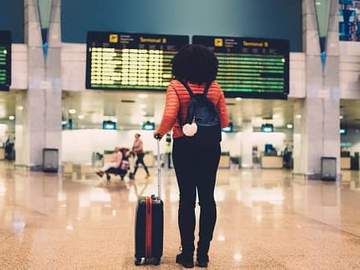
It might have a different spelling wherever you're going.

One or Two L 's?
If you look at where the single l forms originate and where the double l forms originate a pattern emerges: in the United States, traveled and traveling predominate, and everywhere else travelled and travelling are preferred.
The reason mostly comes down to one man we at Merriam-Webster hold especially dear: Noah Webster. Our lexicographical father (brothers George and Charles Merriam bought the rights to Noah Webster’s 1841 dictionary after Webster died) was a great believer in spelling reform and wanted English spelling to make more sense—and if the English of his homeland had more logic to it than its British parent, so much the better. He decided that travel needed only one l in its past and present participle forms.
Webster’s logic is the reason behind the spelling of canceled and cancelled as well: in the U.S., they have just one l , but elsewhere two l ’s are the norm.
American English Words that Use 2 L 's
Webster didn’t think all double l ’s needed to be reduced to one, however: in cases in which the accent, or emphasis, is on the syllable with the l , two l ’s are preserved: expelled and expelling ; controlled and controlling ; patrolled and patrolling .
Word of the Day
See Definitions and Examples »
Get Word of the Day daily email!
Games & Quizzes

Commonly Confused
'canceled' or 'cancelled', what's the difference between 'fascism' and 'socialism', words you always have to look up, is it 'home in' or 'hone in', the difference between 'race' and 'ethnicity', grammar & usage, using bullet points ( • ), point of view: it's personal, 31 useful rhetorical devices, how to use em dashes (—), en dashes (–) , and hyphens (-), plural and possessive names: a guide, 200 new words and definitions added to merriam-webster.com, the longest long words list, pilfer: how to play and win, weird words for autumn time, what does 'at large' mean.

Travelling or Traveling: What’s the Difference?
Home » Travelling or Traveling: What’s the Difference?
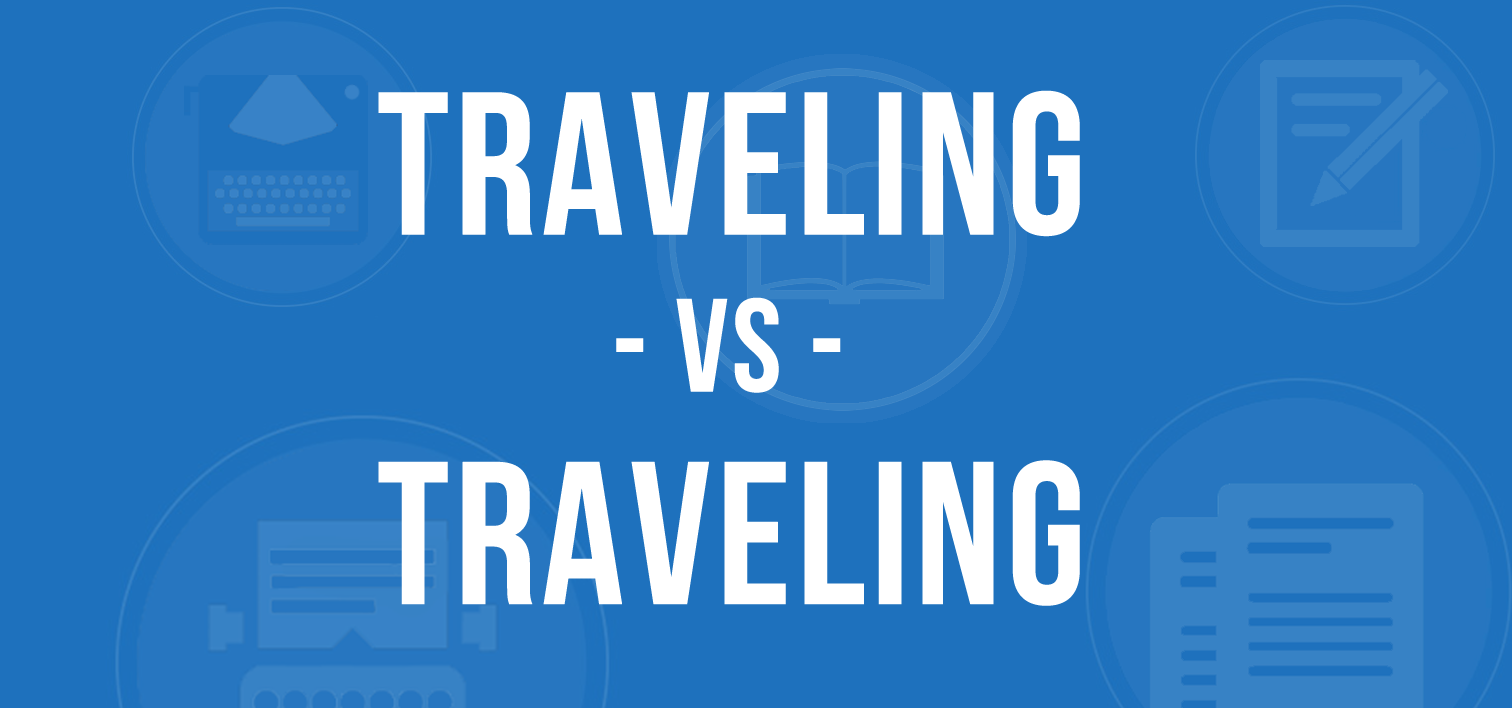
Are you taking a trip anytime soon? If so, where will you be traveling? Or is it travelling? How exactly do you spell this word?
The two words traveling and travelling can cause some confusion for those writers not exactly sure when to use which one. Are they just variations of the same word? Do they have different meanings? Do they function differently in a sentence?
In today’s post, I want to address all of these questions so you will never again wonder or second-guess yourself, “Is it travelling or traveling?”
The Difference Between Travelling and Traveling
Travelling and traveling are both verbs, obviously. To travel is to go from one place to another, as on a trip or journey. For example,

- When the traveling pub is taken off a trailer and put together in a lot near Milwaukee and California avenues, it will boast 400 feet of bar space. – Chicago Sun Times
- They travelled 5,000 miles from Myanmar to place a plaque in Seagrim’s native village of Whissonsett in eastern England. – Washington Post
- Under that analysis, completion of the mobility plan would result in about 35 million miles per day being traveled on L.A. surface streets in 2035. – L.A. Times
You’re probably still thinking, “Okay, I still don’t know how to use these words.”
The difference between traveling vs. travelling isn’t much of a difference at all, really.
In fact, the difference between them is entirely dialectal. There is no demonstrable difference of sense or function, meaning both words can be used interchangeably.
When to Use Travelling
Even though the only thing separating travelling and traveling is a dialectical difference, it is still important to keep your audience in mind when picking which word to use and when.
Travelling (with two Ls) is the preferred spelling in British English and is used much more frequently than is traveling . The graph below shows the use of travelling vs. traveling (as a percentage of all words used) in British English books, journals, and magazines from 1800 to 2008.
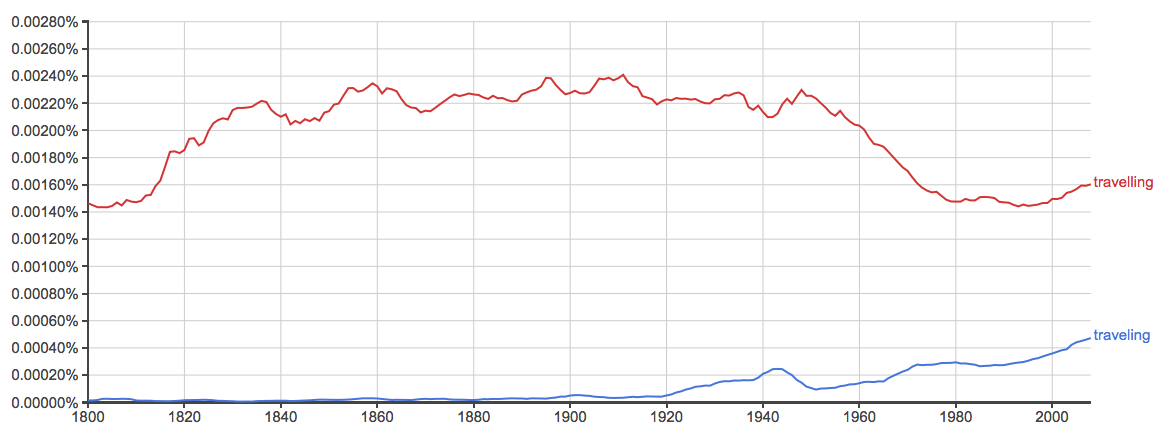
As you can see, travelling (with two Ls) clearly dominates in British English, being used at a rate of about 4:1.
Now, if we look at the same two words over the same time period but limit our search to American print sources, the results completely flip.
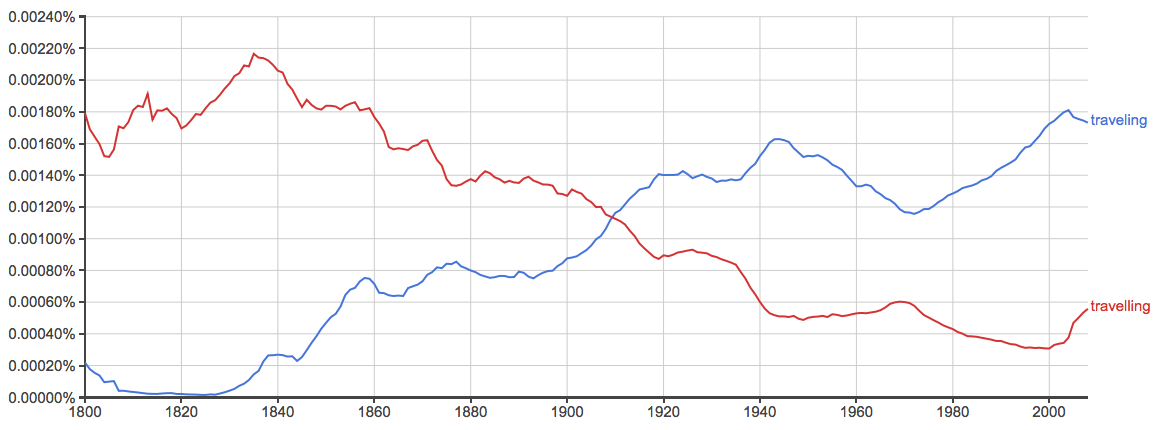
There’s actually a bigger gap between traveling and travelling in American English than there is in British English.
When to Use Traveling
As indicated in the above graph, traveled (with one L) is the preferred spelling in American English.
I’ve discussed the reason for the popularity of many shortened spellings in American English in other posts ( cancelled/canceled comes to mind ), but the basic reason stems back to Noah Webster himself.
He is usually credited with the shortening of many American spellings because in his original 1898 dictionary, he sought to simplify many British spellings he saw as unnecessary. This is where the British-American divide over words like color/colour came from.
Anyway, the point is, if you are writing to an American audience, traveling (with one L) is your best choice.
Remember the Difference – Traveling or Travelling?
One simple way to keep track of these two words is that the shorter spelling is American. If you can keep in mind that, generally speaking, British English favors (favours) the longer spelling of words, you will be able to remember the difference between these words.
It is also worthwhile to note that all of the distinctions in this post apply equally to travelled vs. traveled, traveled vs. travelled, traveller vs. traveler, traveler vs. traveller, etc.
Summary – Traveling vs. Travelling
Is it traveling or travelling? That depends on where you are writing and who is your audience.
- Travelling is the preferred spelling in British English.
- Traveling is the preferred spelling in American English.
Whether you’re talking about travelled or traveled or traveller or traveler, these same preferences still apply.
Grammarflex

“Traveling” or “Travelling” (Which Spelling is Correct?)
- February 12, 2024

Traveling or travelling?
The verb travel , which is to “go from one place to another, especially over a long distance”, uses different spellings based on UK English and US English:
- British English spells “ travelling ” with the double “L”.
- American English spells “ traveling ” with one “L”.
The same goes with other verb forms of “travel” in the past tense i.e., traveled and travelled ; or as a noun, traveler and traveller .
Other words (like traveling or travelling)
Word forms of travel.
Other verb/noun forms also conform to the same spelling rules based on US/UK English:
Sentences with traveling/traveling (present participle)
The travelling / traveling public have had enough of fare increases.
She grew up in a travelling / traveling family.
The birds are travelling / traveling south for the winter.
She enjoys travelling / traveling around Europe.
Sentences with traveled/travelled (past tense)
They travelled / traveled cross-country from New York to California.
The pain travelled / traveled down his back.
They travelled / traveled on the bus to and from work together.
Synonyms of travel
- peregrinate (to travel especially on foot)
Phrases with travel
- travel light
- travel-sick/travel sickness
- travel agent or agency
Origin of the word travel
Etymonline on travel :
Late 14c., “to journey,” from travailen (1300) “to make a journey,” originally “to toil, labor”. Replaced Old English faran . Related: Traveled ; traveling . Traveled (adj.) “having made journeys, experienced in travel” is from early 15c. Traveling salesman is attested from 1885. —Etymonline, travel.
Read more about US English vs. UK English
- Harper, Douglas. “Etymology of humor.” Online Etymology Dictionary, Accessed 12 February, 2024.
- “Peregrinate.” Merriam-Webster.com Dictionary, Merriam-Webster, https://www.merriam-webster.com/dictionary/peregrinate . Accessed 12 Feb. 2024.
Recent Posts

Is it Nerve-Racking, Nerve-Wrecking or Nerve-Wracking?
Which is correct: nerve-wracking or nerve-racking? To describe something as extremely irritating, annoying, or trying; (as in, a nerve-racking day; or a nerve-racking noise), we

“Beck and Call” or “Beckon Call”? Which is Correct?
Meaning of ‘beck and call’ ‘To be at someone’s beck and call‘ is an idiomatic expression that describes being immediately available, or ready to be

What’s the Meaning of the Word “Connotation”?
Ever catch bad vibes from a text? Any feeling or internal response you have from the actual words used to is its connotation; which perhaps

What’s the Difference Between Ambiguous & Ambivalent?
Are ambiguous and ambivalent the same? Something ambiguous (an adjective) is unclear, vague and open to different interpretations. To be ambivalent (also an adjective) means

When to Use Have or Had? (Explained with Examples)
When should you use “have” or “had”? When is it correct to use have, has, or had? Phrased differently, what’s the past tense of have?

What’s the Past Participle? (Explanation & Usage)
The past participle is a form of a verb that can appear as an adjective, or be used to form specific tenses and the passive

Emigrate vs. Immigrate (Meaning + Examples)
Meaning of emigrate vs. immigrate To immigrate is the verb form of the noun immigrant; referring to someone that’s moved away from their birth country


Recurring vs. Reoccurring (Correct Usage, + Examples)
Did you have a recurring or reoccurring dream? If you’re finding the difference between these two words befuddling, then this post is for you. How

What’s the Difference Between Nevertheless vs. Nonetheless?
Nevertheless vs. nonetheless Nevertheless and nonetheless are synonyms that both belong to the same part of speech; i.e, they’re compound adverbs that express contrast. There

Traveling vs. Travelling: Which One Should You Use?
By: Author Oliver
Posted on Last updated: September 5, 2023
Sharing is caring!
Are you confused about whether to spell it as “traveling” or “travelling”? Do you find yourself switching between the two spellings, unsure which one is correct? You’re not alone! The difference in spelling between “traveling” and “travelling” can be confusing, especially for those who are not native English speakers. In this article, we’ll explore the differences between these two spellings and help you understand when to use each one.
Traveling vs. Travelling

Traveling vs. Travelling: The Differences
Traveling vs. travelling | definition.
Travelling and traveling are two spellings of the same word, which means to move from one place to another. The only difference between them is the way they are spelled. Travelling is the preferred spelling in British English, while traveling is the preferred spelling in American English.
Traveling vs. Travelling | Usage
The choice between traveling and travelling depends on the region where you are writing or speaking. If you are writing for an American audience, use traveling. If you are writing for a British audience, use travelling. However, it is worth noting that both spellings are acceptable in both regions, and there is no right or wrong choice.
Key Differences between Travelling and Traveling in a Comparing Table
It’s important to note that the differences between travelling and traveling are minor and do not affect the meaning of the word. Both spellings refer to the same action of moving from one place to another.
Traveling vs. Travelling Examples
When it comes to the spelling of the present participle of the verb “travel,” there are two different spellings: “travelling” and “traveling.” The spelling you choose depends on which English you are using, British or American.
Correct Usage in Different Contexts
In British English, “travelling” with two “Ls” is the standard spelling, while in American English, “traveling” with one “L” is preferred. It is important to note that both spellings are correct, and the choice between them is a matter of regional preference.
Examples of Travelling in Sentences
Here are some examples of “travelling” in sentences:
- I will be travelling to Europe next month.
- She enjoys travelling to new places.
- The company reimburses employees for their travelling expenses.
Examples of Traveling in Sentences
Here are some examples of “traveling” in sentences:
- I will be traveling to Europe next month.
- She enjoys traveling to new places.
- The company reimburses employees for their traveling expenses.
As you can see, the meaning of the sentences is not affected by the spelling choice. However, it is important to be consistent in your spelling choice throughout your writing.
Common Mistakes and Misconceptions
When it comes to the spelling of “traveling” and “travelling,” there are a few common mistakes and misconceptions that people often have. Let’s take a look at some of them.
Mistake #1: Thinking That One Spelling Is Always Correct
One of the biggest mistakes that people make when it comes to “traveling” and “travelling” is assuming that one spelling is always correct. In reality, both spellings are correct, but they are used in different parts of the world. In the United States, “traveling” is the preferred spelling, while in the United Kingdom and other English-speaking countries, “travelling” is more commonly used.
Mistake #2: Using the Wrong Spelling in the Wrong Context
Another common mistake is using the wrong spelling in the wrong context. For example, if you are writing for an American audience, you should use “traveling,” while if you are writing for a British audience, you should use “travelling.” Using the wrong spelling can make your writing look unprofessional and can even make it difficult for readers to understand what you are trying to say.
Misconception #1: One Spelling Is More Correct Than the Other
Some people believe that one spelling is more correct than the other, but this is not true. Both spellings are equally correct, and it is simply a matter of regional preference. If you are unsure which spelling to use, it is always a good idea to check the audience you are writing for and use the appropriate spelling for that region.
Misconception #2: The Spelling Determines the Meaning
Another misconception is that the spelling of “traveling” or “travelling” determines the meaning of the word. In reality, the spelling has no impact on the meaning of the word. “Traveling” and “travelling” both refer to the act of going from one place to another, regardless of how it is spelled.
To summarize, both “traveling” and “travelling” are correct spellings of the same word. However, they are used in different parts of the world and should be used based on your audience. Remember that the spelling does not determine the meaning of the word, so use the appropriate spelling based on your audience and context.
Tips to Remember the Difference Between Travelling and Traveling
Travelling and traveling are two variations of the same word, and they have the same meaning. The only difference is in their spelling, which is entirely dialectal. However, if you want to use the correct spelling, you need to know which one to use and when.
Here are some tips to help you remember the difference between travelling and traveling:
- Know your audience : If you are writing for an American audience, use “traveling.” If you are writing for a British audience, use “travelling.”
- Use a spell checker : If you are unsure which spelling to use, you can use a spell checker to help you. Most spell checkers will give you the correct spelling based on the dialect you have selected.
- Remember the double “L” : The British spelling of “travelling” has a double “L,” while the American spelling of “traveling” has only one “L.” This is an easy way to remember which spelling to use.
- Use consistent spelling : If you are writing a document or article, make sure you use the same spelling throughout. This will help to avoid confusion and make your writing look more professional.
Here are some examples of the correct usage of travelling and traveling:
- I am traveling to New York next week. (American spelling)
- She enjoys travelling to Europe every summer. (British spelling)
- The airline offers free Wi-Fi when you are traveling internationally. (American spelling)
- He has been traveling around Asia for the past six months. (American spelling)
Traveling vs. Travelling Exercises
Do you know the difference between “traveling” and “travelling”? These two words have the same meaning, but they are spelled differently depending on where you are in the world. In this section, we will give you some exercises to help you understand the differences between these two words.
Exercise 1: True or False
Decide if the following statements are true or false.
“Traveling” is the correct spelling in British English.
“Travelling” is the correct spelling in American English.
“Traveling” is more commonly used in the United States.
“Travelling” is more commonly used in the United Kingdom.
Exercise 2: Compare and Contrast
Look at the following table and compare the differences between “traveling” and “travelling”.
As you can see, the only difference between these two words is the spelling. “Traveling” is spelled with one “L” and is more commonly used in the United States, while “travelling” is spelled with two “Ls” and is more commonly used in the United Kingdom.
In conclusion, whether you use “traveling” or “travelling” depends on where you are in the world. It’s important to be aware of these spelling differences so that you can communicate effectively with others.
Frequently Asked Questions
What are the benefits of traveling?
Traveling provides many benefits, including the opportunity to experience new cultures, meet new people, and learn about different ways of life. It can broaden your perspective and help you gain a better understanding of the world. Traveling can also be a great way to relax, escape from your daily routine, and create lasting memories.
How can I write a good travelling essay?
To write a good traveling essay, you should start by choosing a specific topic or destination that you want to write about. Then, you should conduct research to gather information and details about the place or experience. Use descriptive language to paint a vivid picture of the sights, sounds, and experiences you encountered. Finally, make sure to edit and revise your essay to ensure that it is clear, concise, and engaging.
What is Travelling Basketball?
Travelling basketball is a term used to describe youth basketball teams that travel to different locations to compete against other teams. These teams often participate in tournaments and leagues that require them to travel to different cities or states to play.
What is the difference between traveler and traveller?
The difference between traveler and traveller is simply a matter of spelling. Traveler is the American English spelling, while traveller is the British English spelling. Both words refer to a person who travels.
How do you correctly use traveling in a sentence?
Traveling is a present participle that can be used as a verb or an adjective. As a verb, it means to move from one place to another. As an adjective, it describes something related to travel. Here are some examples:
- I am traveling to Europe next week.
- The traveling circus is coming to town.
- The traveling salesman visited several cities in one day.
In summary, traveling and travelling are both correct spellings of the present participle of the verb “travel”. The spelling tends to vary based on whether you’re writing in American or British English. Use the spelling that is appropriate for your audience.
"}},{"@type":"Question","name":"How can I write a good travelling essay?","acceptedAnswer":{"@type":"Answer","text":"
"}},{"@type":"Question","name":"What is Travelling Basketball?","acceptedAnswer":{"@type":"Answer","text":"
"}},{"@type":"Question","name":"What is the difference between traveler and traveller?","acceptedAnswer":{"@type":"Answer","text":"
"}},{"@type":"Question","name":"What is the AP Style for travelled or traveled?","acceptedAnswer":{"@type":"Answer","text":"
According to the AP Stylebook, both traveled and travelled are acceptable spellings. However, the preferred spelling is traveled, without the extra \"l\". This is the spelling used in American English.
"}},{"@type":"Question","name":"How do you correctly use traveling in a sentence?","acceptedAnswer":{"@type":"Answer","text":"
In summary, traveling and travelling are both correct spellings of the present participle of the verb \"travel\". The spelling tends to vary based on whether you're writing in American or British English. Use the spelling that is appropriate for your audience.
- Recent Posts
- Plural of Safe: What It Is and How to Use It Correctly - October 3, 2023
- Purple Color Names: Different Hues of Purple - October 2, 2023
- Addition Transition Words for Clear and Cohesive Writing - September 30, 2023
Related posts:
- WHO vs. WHOM vs. WHOSE: How to Use them Correctly
- Accept vs. Except: Understanding the Difference
- Affect vs. Effect: A Comprehensive Guide
- Alligator vs. Crocodile: Spot the Differences for English Learners!

Traveling vs. Travelling: What’s the Difference?

“Traveling” and “travelling” are both correct. The former is the preferred spelling in American English; the latter is the British spelling. In many places around the world, such as Australia and New Zealand, traditional British English has a stronger influence. As a result, people living in current and former British territories tend to prefer longer spelling variants, such as “colour,” “manoeuvre,” and “aluminium.” Even for words without longer and shorter versions, Americans and Brits sometimes use different letters, as in “pretence” (vs. “pretense”) and “analyse” (vs. “analyze”).
To be fair, many of these British spellings predate the American spellings. The United States adopted simpler variants and shorter spellings based on the work of one man: the lexicographer and linguist Noah Webster. At the turn of the 19th century, he wrote the dictionaries and textbooks that would come to define American usage. As the Encyclopædia Britannica explains, “Webster was instrumental in giving American English a dignity and vitality of its own. Both his speller and dictionary reflected his principle that spelling, grammar, and usage should be based upon the living, spoken language rather than on artificial rules.”
Webster decided that adding a suffix, such as the present participle -ing , should require double consonant spelling when the emphasis is on the last syllable in a multi-syllable word. Because the word “re pel ” has a stronger second syllable, “repelling” has two L s. Words like “travel,” where the emphasis is on the first syllable, should be written with a single consonant.
So, that’s why both spellings work. Thanks to Noah Webster, Americans prefer traveling and South Africans prefer travelling.
Your writing, at its best
Compose bold, clear, mistake-free, writing with Grammarly's AI-powered writing assistant
According to the Online Etymology Dictionary , the word “travel” probably comes from the vulgar Latin word tripaliare, “to torture.” That tells you how much people enjoyed journeys back in those days! By the 12th century, Old French adopted the word travail, meaning “work, labor, toil” or “arduous journey.” Use of the verb travailen in English dates back to 1300, and the spelling “travel” began appearing later that century.
In Shakespeare’s Macbeth , which likely dates from around 1606, we can see the line, “And yet darke Night strangles the trauailing Lampe.” In this example, we can see both the – ai- spelling variant and the use of the letter U for V sounds, which was common in the middle of a word.
The second edition of John Milton’s Paradise Lost (1674) exhibits a spelling variant closer to the modern form of “travelled”:
And long he wanderd, till at last a gleame
Of dawning light turnd thither-ward in haste
His travell’d steps;
From these works, we can see that both the single L and double L spelling have historical precedents.
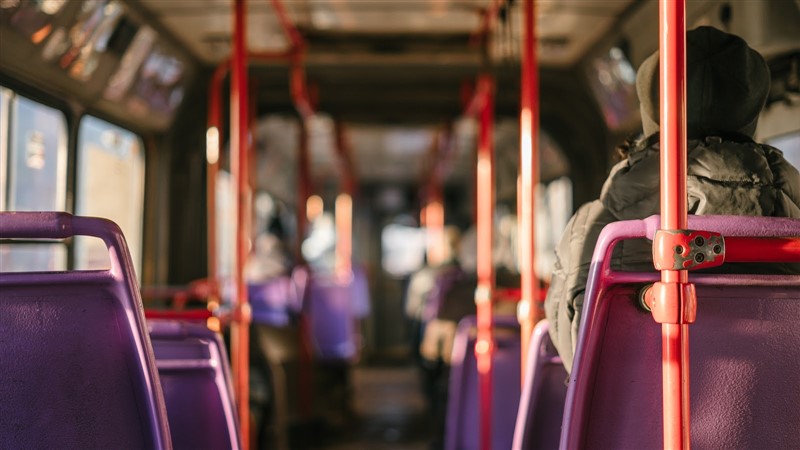
Definitions
Merriam-Webster defines the word “traveling” as an adjective and lists “travelling” as a variant spelling.
The dictionary provides the following meanings:
- going to different places instead of staying in one place
- carried by, used by, or accompanying a traveler
Traveling can also be a conjugation of the verb “to travel.” Merriam-Webster defines travel as, “to go on or as if on a trip or tour” and “to move or undergo transmission from one place to another,” among other definitions.
According to Thesaurus.com , synonyms for traveling include:
Other Words and Phrases
A “traveler’s check” is a preprinted check, used in the place of cash, intended to protect international travelers from theft. The Online Etymology Dictionary explains that the term originated in 1891.
A “travel-agent” or “travel agent” is a person or company employed to make travel arrangements. Although the term originated in 1925, the first travel agents ( Cox & Kings ) predated the moniker by over 150 years.
U.S. traveler Burton Holmes invented the word “travelogue” by combining the word “travel” and the Greek suffix – logue. A travelogue describes a piece of writing, a lecture, or a film about travel.
“Taking the path less traveled” is an idiom used to describe an uncommon choice. The phrase comes from the Robert Frost poem, “ The Road Not Taken ,” which contains the lines: “Two roads diverged in a wood, and I— / I took the one less traveled by.”
“Traveling light” is an idiom referring to someone who travels without much luggage. The phrase can also be used in a figurative sense to describe someone without ties or responsibilities.
The Words in Context
“…Experts say that traveling by car may be the safest option in a pandemic — but road trips still come with risks.” — The Washington Post , “Hitting the Road? Here’s What to Know…”
“An expanding list of Canadian politicians are in hot water after being caught vacationing or travelling abroad amid a worsening COVID-19 pandemic at home.” — CTV News , “Growing List of Canadian Politicians …”
“New York City has introduced quarantine rules for international travellers following emergence of new Covid variants in countries like the UK.” — BBC News , “Coronavirus: New York City Orders International Visitors…”
“Belize is the only English-language-official country in Central America. As a popular tourist destination, English is spoken by everyone, and many prices are listed in U.S. Dollars (the Belize dollar is tied to the U.S. Dollar with a fixed exchange rate), making it a comfortable destination for first-time international travelers.” — USA Today , “Did you know? English is the Official…”
- https://www.etymonline.com/word/travail
- https://www.etymonline.com/search?q=travel
- https://www.merriam-webster.com/dictionary/traveling
- https://www.merriam-webster.com/dictionary/travel
- https://www.thesaurus.com/browse/traveling?s=t
- https://www.poetryfoundation.org/poems/44272/the-road-not-taken
- https://www.washingtonpost.com/travel/tips/road-trip-rest-stop-covid/
- https://www.ctvnews.ca/politics/growing-list-of-canadian-politicians-caught-travelling-abroad-despite-pandemic-1.5251039
- https://www.usatoday.com/story/travel/destinations/2020/02/03/english-official-language-these-five-countries/4556924002/
- https://www.bbc.com/news/world-us-canada-55432977

Kari Lisa Johnson
I’m an award-winning playwright with a penchant for wordplay. After earning a perfect score on the Writing SAT, I worked my way through Brown University by moonlighting as a Kaplan Test Prep tutor. I received a BA with honors in Literary Arts (Playwriting)—which gave me the opportunity to study under Pulitzer Prize-winner Paula Vogel. In my previous roles as new media producer with Rosetta Stone, director of marketing for global ventures with The Juilliard School, and vice president of digital strategy with Up & Coming Media, I helped develop the voice for international brands. From my home office in Maui, Hawaii, I currently work on freelance and ghostwriting projects.
Recent Posts

Allude vs. Elude?

Bad vs. badly?

Labor vs. labour?

Adaptor vs. adapter?

IMAGES
VIDEO
COMMENTS
What to Know. When it comes to spelling the forms of the verb travel, traveled and traveling are more common in the US, and travelled and travelling are dominant everywhere else. Spelling is typically clear-cut in modern English: …
Traveling is the preferred spelling in the United States. Travelling is the preferred spelling in the UK or in the Commonwealth. This American-British spelling difference carries for …
Travelling is the preferred spelling in British English. Traveling is the preferred spelling in American English. Whether you’re talking about travelled or traveled or traveller or traveler, these same preferences still apply.
When it comes to writing the word for moving from one place to another, both “traveling” and “travelling” are correct. The difference lies in where you are or who your audience is. In the United States, people prefer to use one …
The verb travel, which is to “go from one place to another, especially over a long distance”, uses different spellings based on UK English and US English: British English spells “ travelling ” with the double “L”. American …
When it comes to the spelling of the present participle of the verb “travel,” there are two different spellings: “travelling” and “traveling.” The spelling you choose depends on which English you are using, British or …
“Traveling” and “travelling” are both correct. The former is the preferred spelling in American English; the latter is the British spelling. In many places around the world, such as Australia and New Zealand, traditional British …